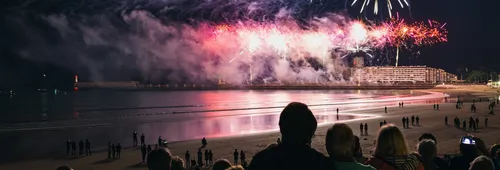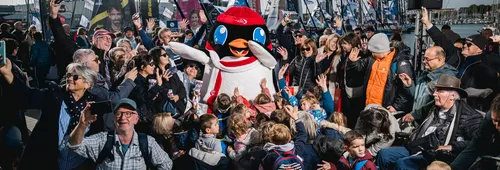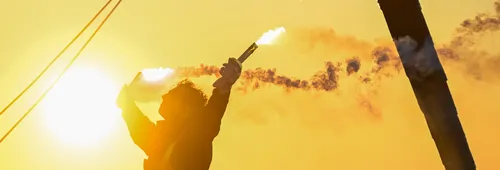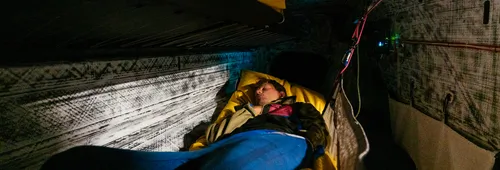So Heer, now 36, joined Alex Thomson Racing as a nipper and rose through the ranks to be ultimately become responsible for Hugo Boss up to and after the start of the last Vendée Globe. And while he had been wrestling with the idea of setting up his own challenge it was only when he was delivering Thomson’s boat back to the UK, after the British skipper had retired into Cape Town last time, that Thomson advised him to take the plunge and go for it.
His qualifying route to get to the start line has seen several setbacks. A collision at the start of the Route du Rhum meant he had to stop into Lorient to repair his boat and set off some five days later. And on this Spring’s The Transat his boat was knocked down which caused a major power failure meaning he had to limp to the finish many days after his rivals spending hours hand steering. But he proved himself on the New York Vendée race and so will now complete his ‘boat captain to solo Vendée Globe skipper’ journey when he lines up on Sunday 10th November.
Oliver Heer : "I am so pleased and proud to be here!"
WHAT THE SKIPPERS SAID (23/40) : From Zurich, and so hoping to be the first Swiss-German skipper to finish the Vendée Globe, Ollie Heer has been a fan of the solo, non-stop round the world race since he was very young. After a fledgling career in business in the Far East he chose to follow his dreams after the premature passing of his sailing mad father.

Vendée Globe :
Your journey to get here has been touch and go at times…

I am now actually very happy, and in a way, proud, of where we find ourselves, although only due really to late developments. The beginning was not that easy, and we struggled to find a budget but at the end we gave ourselves the aim of taking part in the Vendee Globe with a boat which is prepared, with a good team in the background and a title sponsor on the boat and this has all come to fruition, so I’m actually quite happy and proud to be here.
Vendée Globe :
They always say it’s harder to get to the start line. That’s a bigger challenge than actually completing the race.
Yes, for sure, people only really see the romantic side of the story which is just going sailing. That’s a third of our life. The other two thirds it’s tough business and it’s definitely a big challenge to actually get to the start of the race, finding the funding and everything. And so now I can’t wait to set off on what my wife Theresa calls my ‘sailing holiday.’! (laughs)
Vendée Globe :
Talk to us little bit about the real downtimes. How many points have you thought ‘I’m not going to make it’? Or have you always been positive?
To the outside I was always very confident and full of energy and optimism that we’d get to the start, but I think I’d definitely be lying if I said that was always the way I was thinking inside of me. There were definitely times where we had big question marks about whether we would make it, be it performance-wise, be it selection and qualification-wise or from a financial perspective. It was touch and go a couple of times.
Vendée Globe :
You have had numerous problems on big races like the Route du Rhum and The Transat for example, but in fact how has your actual sailing performance changed or improved over the last two years?
I am now very confident that I can pretty much deal with anything that a race can throw at me. I would say I haven’t had a particularly easy two and a half years behind me but I always managed to a) achieve my ultimate goal and b) to get the boat and myself back to land safely. This gives me a lot of confidence to tackle the Vendée Globe especially the Southern Ocean.
Vendée Globe :
From that perspective and from learning from the experiences you’ve had, what are you taking with you in terms of spares that maybe others are not or what contingencies do you have in place?
All that I keep telling myself is, ‘you don’t lose a race because of an extra 10kg of spares, you might as well take it.’ If I can’t with clarity say ‘no I don’t need this’ then it’s most likely a wise decision to take it. And then it’s not just the decision of the spares, it’s the critical equipment of the boat that tends to cause problems and then we have a bit of, it’s just wise to take as many things as you can.
Vendée Globe :
Getting that final piece of the budget in place, what difference did that make in terms of performance, being able to buy things like sails?
We have a full suit of new sails. We have all new cables, new furlers, new hooks. So basically the rigging is all new, new sheets, all new halyards. So on the rigging side it’s all a complete new base. And then from the electronic side we have new batteries, new solar panels, new hydro-generators, new alternators. The whole power generation side has been changed completely and last winter we changed all the B & G systems and pilots etc so really all the systems on board have all been replaced in ‘24.
Vendée Globe :
And the boat which was launched as Gitana originally knows its way around the race course.
After Gitana not finishing with Loick Peyron in 2008-9 (he was dismasted when leading) , it was Jean Le Cam’s boat in the race 2012. Then it was Fabrice Amadeo’s finishing the race in 2016. And then it was Romain Attanasio’s finishing the race 2020. The boat has a good record. The structural part of the boat I think is pretty much bulletproof.
Vendée Globe :
And how do you think you’ll deal with the loneliness, being solo? Is that something you’ve worked on?
I can’t with certainty say how I’ll react because I haven’t ever been isolated for that long. I know from my time how important the mental side of the training is and performance and I have been working with the same mental performance coach for the last two and a half years and he’s great help and we try to visualise in our sessions together how it will be being alone on, I don’t know, say, day forty-five, half way round. I’m confident that I have got enough resilience. So I won’t be too affected.
Vendée Globe :
The trials and tribulations you’ve been through, they say ‘what doesn’t kill you makes you stronger’.
Sailing is constant problem solving and I think in every problem or every negative experience, there are also so many positives you pull out of it. So whenever I had one of my rather difficult moments at sea, in the debrief afterwards I always tried to find the positives and say ok, even though it happened, it might actually be a good thing because of that in these experiences we also base our decisions of what we change on the boat and where we do upgrades and stuff. So yeah, I’ll always pull the positives out of negatives.
Vendée Globe :
When you reach the points in the race where you have to detune or destress, needing to come out of the intensity of the race, what are your ‘go to’ things? Are you podcasts or music or food?
I don’t read any books, I don’t carry a single book with me on the boat but I do listen to a lot of audiobooks and podcasts. And I’ll make sure I have occasional conversations with close family members, my wife my brother or people like. For me it helps you to…And audio books I like autobiographies, or business podcasts or these kinds of things I’m interested in.
Vendée Globe :
Who’s the most inspiring autobiography you’ve read recently or you’ve listened to at sea?
Well, it might not necessarily be an autobiography but the Diary of a CEO with Steven Bartlett. He is a very very inspiring. He is holding a lot of inspiring conversations with inspiring people.
Vendée Globe :
On the race course who will be your benchmarks or are you really looking to sail your own race?
Well from my past races I tend to sail a little bit too hard and to break the boat so I’m really trying to rein it back for the first two thirds of the race, I don’t look at it too much as a race. I can not be drawn in and base my performance or how much I push based on another boat’s performance. But that’s easier said than done! But I will really try to just sail my own course. Every now and then I tell myself that it’s just a long, long solo delivery. But then if you’re honest, I think there are some boats that are very close to my boat like Seb Marsset is on my sister ship. I would also be interested to see how I do against Manu Cousin on my sister ship but he’s done a lot of upgrades to it. And then all the daggerboards boats I think it will be like almost a race within a race. It is going to be interesting.
Vendée Globe :
What are your very first memories of the Vendee? What inspired you in the beginning?
I was fortunate enough that I grew up without the age of the internet so I remember the Vendee Globe as following the races in magazines but it was the early early 2000s. So Dominique Wavre on Mirabaud, the Swiss contestant and I remember always just cutting out the pictures from the magazines and I put them in my room and it was full of Vendee Globe and Whitbread pictures.
Vendée Globe :
You didn’t have footballers, tennis players or any other sports heroes?
No, never. It was just always sailing.







